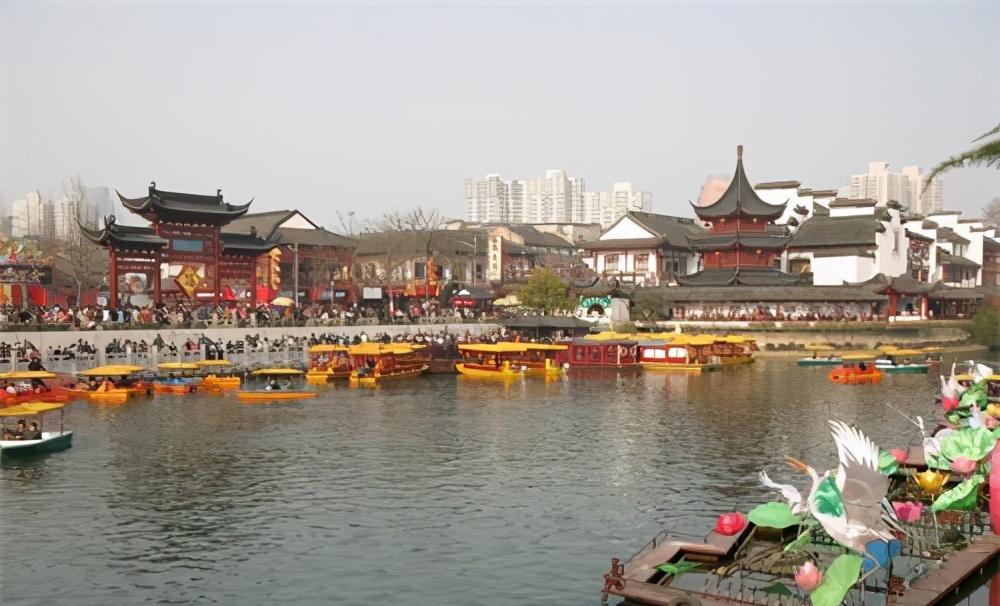
When it comes to Qinhuai boat dishes, we must first start from the Qinhuai painting boat. It is said that after Zhu Yuanzhang fixed the capital in Nanjing, he once visited the Confucius Temple, saw the pavilions on both sides of the Qinhuai River, the scenery was pleasant, and said: "Sorry for the lack of yachts in the river." The patters rushed to build the painting boat when they heard it. In 1372, Zhu Yuanzhang personally gave a couplet on the Lantern Festival, advocated the prosperity of the wind and moon on the Qinhuai River, and ordered the ten thousand water lamps to be burned on the river, and mobilized nobles and gentry and merchants to sit in lamp boats to watch. That night, the light boat came and went, like a fire dragon, and the silk bamboo song inside the boat blew, from Jubao Gate (Zhonghua Gate) to Tongji Gate Water Pass, all night long.
In the Qinhuai Painting Boat, the ripples on the Qinhuai River, enjoying the beautiful scenery on both sides of the river, how leisurely. Subsequently, the number of painting boats gradually increased, becoming a scene of Qin Huai. The use of the painting boat was later developed not only as a viewing scene, but also as a place for pleasure. Every year after the Dragon Boat Festival, the Qinhuai River becomes active and lasts until after the Mid-Autumn Festival. At its peak, there were more than 200 to 300 boats on the Qinhuai River, and the main piers were Taoyedu, East and West Fishing Alleys, Dazhong Bridge, Fucheng Bridge and so on. From Shiba Street to Dongshuiguan, there are river halls on the side of the river, and on the shore of the water, singing and dancing, the water of the Qinhuai River is decorated with colorful colors and full of light.
Painting boats are generally divided into five classes according to size: walking cabins, small border ports, anger, rattan sheds and lacquer plates. The smallest lacquer board, only three or four chairs and stools, the price is low, generally three or two literati or lovers to get together; rattan sheds are often used for several people to gather and gamble; they can accommodate eight to ten people to feast; Xiaobian Port is also known as four different elephants, which can accommodate more than ten people; the largest is called the cabin, commonly known as the big border port, is a building ship, divided into three cabins, carved beams and paintings, and the rear cabin has pavilions, which can be climbed and overlooked from a distance. There were only three such large ships at that time, and later stopped in Panchi and named them "Yuelai", "Victory", and "Civilization". The cabin and the small border port can be called the "gold cave".
Boat dishes are generally based on feasts, and most of them are high-end dishes, such as swallow wing double grilled mats, shark fin roast duck mats, shark fin soup mats, sea cucumber belt grilled mats, etc. Sometimes a dozen tourists are on the same boat for more than ten consecutive days, and the chefs have to use their brains to renovate the décor and please the customers. New dishes such as colorful fish clips, dried osmanthus scallops, and hibiscus chicken steak are the result of innovations in the production of boat dishes.
Boat dishes are not only of high specifications, but also exquisitely made, paying attention to the harmony of shape and color, and the taste is relatively light to help tourists Yaxing. Cold dinner receptions and sweets are often held on board, which is very flavorful. The rice used on the boat is usually wrapped in assorted lotus leaves, and fried with more than ten kinds of raw materials such as shrimp, sea cucumber, dried scallops, etc., slightly steamed when eaten, and when opened, it is fragrant and has a very good taste.
After years of accumulation and research, Nanjing Food Tide Hui has now developed many lost Qinhuai boat dishes, including "Gong Tan Stewed Sea Cucumber", "Xiaowan Fish Belly White", "Wang Xie Tang Qianyan", "Green Blood Peach Blossom Fan" and a number of representative dishes, the name of the dish is rich in strong "Qinhuai flavor", and there is a kind of "Nanjing incense" in taste.
Such delicious boat dishes, do you like it? (Welcome to pay attention to the WeChat public account: njhfhhh, feel the history during the trip)